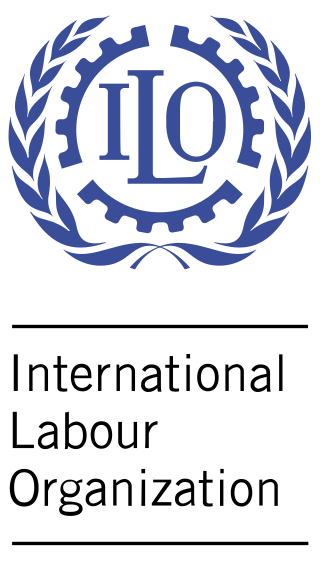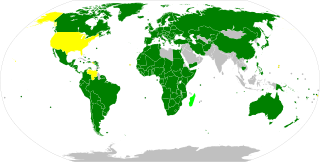Related Research Articles

Human rights are moral principles or norms that establish standards of human behaviour and are regularly protected as substantive rights in municipal and international law. They are commonly understood as inalienable, fundamental rights "to which a person is inherently entitled simply because he or she is a human being" and which are "inherent in all human beings", regardless of age, ethnic origin, location, language, religion, ethnicity, or any other status. They are applicable everywhere and at all times in the sense of being universal, and they are egalitarian in the sense of being the same for everyone. They are regarded as requiring empathy and the rule of law, and imposing an obligation on individuals to respect the human rights of others; it is generally considered that they should not be taken away except as a result of due process based on specific circumstances.

The International Labour Organization (ILO) is a United Nations agency whose mandate is to advance social and economic justice by setting international labour standards. Founded in October 1919 under the League of Nations, it is one of the first and oldest specialized agencies of the UN. The ILO has 187 member states: 186 out of 193 UN member states plus the Cook Islands. It is headquartered in Geneva, Switzerland, with around 40 field offices around the world, and employs some 3,381 staff across 107 nations, of whom 1,698 work in technical cooperation programmes and projects.

The Charter of the United Nations (UN) is the foundational treaty of the United Nations. It establishes the purposes, governing structure, and overall framework of the UN system, including its six principal organs: the Secretariat, the General Assembly, the Security Council, the Economic and Social Council, the International Court of Justice, and the Trusteeship Council.
Freedom of association encompasses both an individual's right to join or leave groups voluntarily, the right of the group to take collective action to pursue the interests of its members, and the right of an association to accept or decline membership based on certain criteria. It can be described as the right of a person coming together with other individuals to collectively express, promote, pursue and/or defend common interests. Freedom of association is both an individual right and a collective right, guaranteed by all modern and democratic legal systems, including the United States Bill of Rights, article 11 of the European Convention on Human Rights, section 2 of the Canadian Charter of Rights and Freedoms, and international law, including articles 20 and 23 of the Universal Declaration of Human Rights and article 22 of International Covenant on Civil and Political Rights. The Declaration on Fundamental Principles and Rights at Work by the International Labour Organization also ensures these rights.

United Kingdom labour law regulates the relations between workers, employers and trade unions. People at work in the UK have a minimum set of employment rights, from Acts of Parliament, Regulations, common law and equity. This includes the right to a minimum wage of £11.44 for over-23-year-olds from April 2023 under the National Minimum Wage Act 1998. The Working Time Regulations 1998 give the right to 28 days paid holidays, breaks from work, and attempt to limit long working hours. The Employment Rights Act 1996 gives the right to leave for child care, and the right to request flexible working patterns. The Pensions Act 2008 gives the right to be automatically enrolled in a basic occupational pension, whose funds must be protected according to the Pensions Act 1995. Workers must be able to vote for trustees of their occupational pensions under the Pensions Act 2004. In some enterprises, such as universities or NHS foundation trusts, staff can vote for the directors of the organisation. In enterprises with over 50 staff, workers must be negotiated with, with a view to agreement on any contract or workplace organisation changes, major economic developments or difficulties. The UK Corporate Governance Code recommends worker involvement in voting for a listed company's board of directors but does not yet follow international standards in protecting the right to vote in law. Collective bargaining, between democratically organised trade unions and the enterprise's management, has been seen as a "single channel" for individual workers to counteract the employer's abuse of power when it dismisses staff or fix the terms of work. Collective agreements are ultimately backed up by a trade union's right to strike: a fundamental requirement of democratic society in international law. Under the Trade Union and Labour Relations (Consolidation) Act 1992 strike action is protected when it is "in contemplation or furtherance of a trade dispute".
A supranational union is a type of international organization and political union that is empowered to directly exercise some of the powers and functions otherwise reserved to states. A supranational organization involves a greater transfer of or limitation of state sovereignty than other kinds of international organizations.

The Convention Relating to the Status of Refugees, also known as the 1951 Refugee Convention or the Geneva Convention of 28 July 1951 is a United Nations multilateral treaty that defines who a refugee is and sets out the rights of individuals who are granted asylum and the responsibilities of nations that grant asylum. The convention also sets out which people do not qualify as refugees, such as war criminals. The convention also provides for some visa-free travel for holders of refugee travel documents issued under the convention.
Minority rights are the normal individual rights as applied to members of racial, ethnic, class, religious, linguistic or gender and sexual minorities, and also the collective rights accorded to any minority group.
The Declaration of Philadelphia restated the traditional objectives of the International Labour Organization (ILO) and then branched out in two new directions: the centrality of human rights to social policy, and the need for international economic planning. With the end of the world war in sight, it sought to adapt the guiding principles of the ILO "to the new realities and to the new aspirations aroused by the hopes for a better world." It was adopted at the 26th Conference of the ILO in Philadelphia, United States of America. In 1946, when the ILO's constitution was being revised by the General Conference convened in Montreal, the Declaration of Philadelphia was annexed to the constitution and forms an integral part of it by Article 1.
The Freedom of Association and Protection of the Right to Organise Convention (1948) No 87 is an International Labour Organization Convention, and one of eight conventions that form the core of international labour law, as interpreted by the Declaration on Fundamental Principles and Rights at Work.
The Right to Organise and Collective Bargaining Convention (1949) No 98 is an International Labour Organization Convention. It is one of eight ILO fundamental conventions.

The Third Moscow Conference between the major Allies of World War II took place during October 18 to November 11, 1943, at the Moscow Kremlin and Spiridonovka Palace. It was composed of major diplomats, ministers and generals, who discussed cooperation in the war effort, and issued the Moscow Declaration.
The Stockholm Declaration of 1972, or the Declaration of the United Nations Conference on the Human Environment, is the first United Nations declaration on the global environment. It consists of 26 principles and led to the creation of the United Nations Environment Programme (UNEP), which laid the foundation for future global environmental governance. The United Nations Conference on the Human Environment was held in Stockholm, Sweden, from June 5–16 in 1972. The 1972 United Nations Conference on the Human Environment signifies the first international effort to place environmental issues at the forefront of global concerns. The Conference sought to recognize the finite nature of Earth's resources and human impacts on the environment. It represented the beginning of a global dialogue on the link between economic growth, the pollution of the environment, and the well-being of humanity. The resulting Stockholm Declaration urged its partnering nations to reduce air, land, and water degradation by integrating science and technology in their development plans. It also called nations to create regulations on wildlife protection, environmental conservation, and population control. While the reception of the ideas in the Declaration generally stayed positive, it received wide criticisms on its practical implementation, especially from developing nations.
The Universal Declaration on Animal Welfare (UDAW) is a proposed inter-governmental agreement to recognise that animals are sentient, to prevent cruelty and reduce suffering, and to promote standards on the welfare of animals such as farm animals, companion animals, animals in scientific research, draught animals, wildlife and animals in recreation. The declaration has not been agreed and focus has largely shifted over to creating the more legally binding UN Convention on Animal Health and Protection (UNCAHP).

Tripartism is an economic system of neo-corporatism based on a mixed economy and tripartite contracts between employers' organizations, trade unions, and the government of a country. Each is to act as a social partner to create economic policy through cooperation, consultation, negotiation, and compromise. In Tripartism, the government has a large role in the economy and engages in negotiations between labour unions and business interest groups to establish economic policy.
Labour standards in the World Trade Organization are binding rules, which form a part of the jurisprudence and principles applied within the rule making institutions of the World Trade Organization (WTO). Labour standards play an implicit, but not an overt role within the WTO, however it forms a prominent issue facing the WTO today, and has generated a wealth of academic debate.

The constitution of the United Kingdom comprises the written and unwritten arrangements that establish the United Kingdom of Great Britain and Northern Ireland as a political body. Unlike in most countries, no official attempt has been made to codify such arrangements into a single document, thus it is known as an uncodified constitution. This enables the constitution to be easily changed as no provisions are formally entrenched.

Matadeen v Pointu [1998] UKPC 9 is a constitutional law decision of the Judicial Committee of the Privy Council on appeal from the Supreme Court of Mauritius. The case is relevant for English administrative law and concerns equal rights and protection under a constitution.
International labour law is the body of rules spanning public and private international law which concern the rights and duties of employees, employers, trade unions and governments in regulating Work and the workplace. The International Labour Organization and the World Trade Organization have been the main international bodies involved in reforming labour markets. The International Monetary Fund and the World Bank have indirectly driven changes in labour policy by demanding structural adjustment conditions for receiving loans or grants. Issues regarding Conflict of laws arise, determined by national courts, when people work in more than one country, and supra-national bodies, particularly in the law of the European Union, have a growing body of rules regarding labour rights.
References
- ↑ O'Higgins, P., 'Labour is not a Commodity' — an Irish Contribution to International Labour Law' (1997) 26(3) Industrial Law Journal 225-234